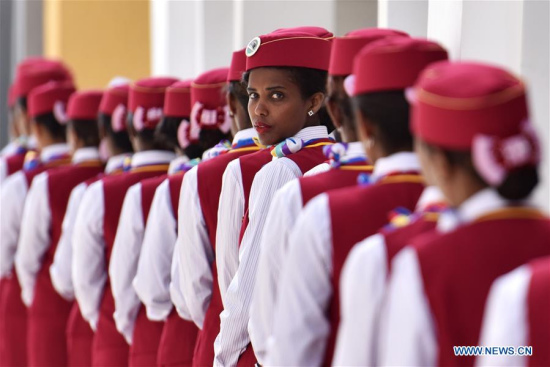
Ethiopian attendants participate in the opening ceremony of Ethiopia-Djibouti railway at the Lebu station in Addis Ababa, Ethiopia, on Oct. 5, 2016. (Xinhua/Sun Ruibo)
FOCAC FORGES STRONGER TIES
The summit of the Forum on China-Africa Cooperation (FOCAC) held in December 2015 in South Africa's Johannesburg was a milestone for bilateral ties. It sent a strong message to the global community that China and Africa stand together and win together.
The majority of the cooperation plans, announced during the summit covering industrialization, agriculture, infrastructure, finance, trade facilitation, poverty reduction and public health, among others, have been achieved.
Agricultural modernization, for instance, is a key cooperation plan between China and Mozambique. In an interview with Xinhua, Chinese Ambassador to Mozambique Su Jian said the Wanbao rice farm project based in Mozambique's Gaza province was an exemplary model for China-Africa cooperation.
"The project will greatly help Mozambique address its rice shortfall of up to 600,000 tonnes annually," Su said, noting that local farmers are learning new farming skills and technologies from Chinese companies and have improved their lives.
"This clearly shows how China's principles in its Africa policy are benefiting the ordinary population," Su said.
The success of these cooperation initiatives also gained acclaim from independent institutions. A 2017 report from McKinsey & Company, a global business counselor, said China has become Africa's most important economic partner in two decades. "Across trade, investment, infrastructure financing, and aid, no other country has such depth and breadth of engagement in Africa," it said.
It said Chinese firms are bringing capital investment, management know-how, and entrepreneurial energy to every corner of the continent, and in doing so they are helping to accelerate the progress of African economies.
"In Madagascar and other parts of Africa, big Chinese technical firms like Huawei and ZTE have a strong presence," Ratrimoarvony said. "In many African towns and even villages, you can also see Chinese doing business. Their commercial activities have become a part of the socio-economic lives in Africa, and this is a strong sign of very strong China-Africa cooperation."
"Bilateral relations will only grow stronger over time as Chinese and African leaders are continuously exploring new cooperation areas and strengthening mutual trust," he said.
GREAT PLANS FOR COMMON DEVELOPMENT
In September, a new FOCAC summit will be held in Beijing, where top policymakers from China and Africa are to firm-up key cooperation plans.
China and African nations are expected to align their development strategies and coordinate policies under the Belt and Road Initiative, the UN's Sustainable Development Goals and the African Union's 2063 Agenda.
"China and Africa are always a community of common destiny as they share deep-rooted friendship and the same pursuit of development and prosperity," China's top legislator Li Zhanshu has said, as he makes visit to three African nations, namely Ethiopia, Mozambique and Namibia from May 9 to 18.
Li, chairman of the Standing Committee of the National People's Congress, said China is happy to see a united, peaceful and prosperous Africa and stands ready to further its comprehensive and practical cooperation with the continent, noting the hope for more fruitful results within the frameworks of the Belt and Road Initiative and the FOCAC.
The top legislator also expressed the belief that China and Africa will work together to make the Beijing summit of the FOCAC in September a historic event to advance China-Africa cooperation.
Currently, sub-Saharan Africa is witnessing a growth uptick with regional economy to recover to 3.4 percent this year from a 20-year low of 1.4 percent in 2016, according to the International Monetary Fund in its economic outlook report for the region.
The report highlighted the Belt and Road Initiative for its impact on supporting private investment in Africa. It said countries including Kenya, Ethiopia, Mozambique, South Africa and Tanzania are seeking active involvement, and the coverage is likely to expand over time.
The initiative could help sub-Saharan Africa better integrate into global value chains, it added.
Stephen Ndegwa, public policy lecturer at the United States International University Africa based in Kenya, said eastern and southern Africa could be important bases for projects related to the initiative.
He said that as China commits to further reform and opening-up, China's capital and technologies will closely interact with Africa's natural resources, demographic dividends and market potentials, thus creating new growth for both sides.


















































